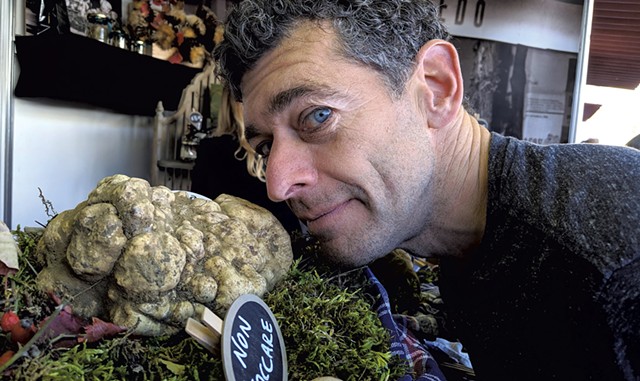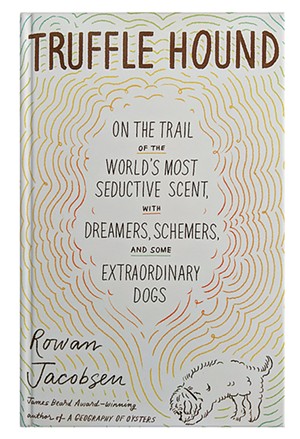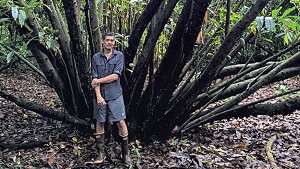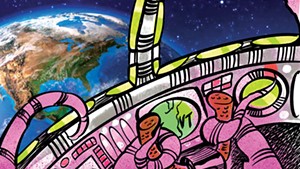
- Courtesy
- Rowan Jacobsen
Spoiler alert: Author Rowan Jacobsen is sure there are wild truffles to be discovered underground in certain parts of Vermont, especially in the marble- and limestone-rich Champlain Valley. But first, he advises, you'll need to train a dog (not a pig) to sniff them out for you.
Jacobsen, 53, has yet to find a truffle in Calais, where he has lived with his wife, poet Mary Elder Jacobsen, since 1993. But in Truffle Hound: On the Trail of the World's Most Seductive Scent, With Dreamers, Schemers, and Some Extraordinary Dogs, the James Beard award-winning author does recount his failed attempt to turn Friday, their 11-year-old cockapoo, into the kind of trained truffle-hunting dog his new book celebrates.
Published in October, Jacobsen's eighth book bounded out of the gate with starred reviews from industry arbiters Kirkus Reviews and Publishers Weekly; the latter also named Truffle Hound among its top 25 nonfiction books of 2021.
In the book, Jacobsen sets out in search of the backstory and future prospects of the entrancing, fabled "fruiting bodies of subterranean fungi." After taking the reader on an odiferous journey through Italy, Istria, Hungary, Spain, England and several U.S. states, he comes home. His final chapter focuses on stalking a largely unknown but reputedly delicious species called the Appalachian truffle that grows in the wild from North Carolina to eastern Canada; he lacks only a truffle dog of his own to start looking for Vermont specimens.
As Jacobsen explains in his book, humans rely on the superior smelling capacity of dogs to find buried truffles. "It's like photography," he writes. "Dogs have a bigger lens that captures more light, a hundred times more pixels for recording the image, and a more observant photographer at the helm."
To lead his truffle hunt, Jacobsen recruits Friday. When the dog enjoys initial success retrieving a truffle-scented dog toy, Jacobsen ups the challenge. He hides the toy under a towel and urges his dog to "Get the truffle!" Friday's response? He "gazes up at me with his sad spaniel eyes. Then walks up to me, knocks over the box of my treats with his nose, and buries his head in my lap."
This amusing anecdote is humdrum compared with many others in Truffle Hound. As Publishers Weekly raved, the book "is as potent as its subject's intoxicating aroma, and is packed to the gills with deception, intrigue, and accounts of illegal trading." That's a slight oversell — it makes the book sound like a James Bond movie — but Jacobsen does effectively leverage unexpected conflict, vividly drawn scenes and quirky characters to pull readers through his narrative.
The drama is headlined by a diverse cast of truffle species led by Tuber magnatum, the white truffle of Italy, and Tuber melanosporum, the black winter truffle associated with the Périgord region of France. Awards for best supporting actor might go to "a mild-mannered mycologist with wizardly eyebrows" who moonlights as the Grand Master of the Saint Ladislaus Order of Truffle Knights, or an old Hungarian man with piercing blue eyes and limited English. When Jacobsen asks him why he likes hunting truffles, the man "leans forward, elbows on the table, there in that collapsed town, as his country slips further into darkness, and fixes me with that stoic gaze. 'Free.'"
I am a longtime fan of Jacobsen's smart, witty, evocative, science-informed food writing, including his past tomes illuminating apples, oysters, honeybees and the concept of terroir, or taste of place. He is also a prolific freelance journalist who honed his serious science chops during a 2017-18 Knight Science Journalism fellowship at the Massachusetts Institute of Technology.
When I did a quick web search to see what Jacobsen had been up to recently besides truffles, I was intrigued to find a November 22 Newsweek article with his byline titled "How Dr. Fauci and Other Officials Withheld Information on China's Coronavirus Experiments." Further digging revealed several COVID-19-related stories in Scientific American, MIT Technology Review and elsewhere, addressing topics such as the controversial theory that Wuhan Institute of Virology research might have started the pandemic.
Before we talked truffles, I asked Jacobsen how he had come to focus on pandemic science. During his MIT fellowship, he said, he concentrated on the opportunities and risks of gene editing, which he described as "stuff about manipulating genes for either good or bad." Specifically, he investigated the possibility that those technologies might accidentally create a super pathogen.
When COVID-19 spread and people raised the question of whether the virus could have come from a lab, Jacobsen continued, "All the authorities said, 'Absolutely not.' But I knew that was not true. It just raised an eyebrow [for me], like, why are they over-insisting that it didn't? Then I got curious, and I went deep down that rabbit hole."
Jacobsen still stands by what he wrote for a September 2020 Boston Magazine article: "To this day, there is no definitive evidence as to whether the virus occurred naturally or had its origins in a lab..."

- Courtesy
- Truffle Hound: On the Trail of the World's Most Seductive Scent, With Dreamers, Schemers, and Some Extraordinary Dogs by Rowan Jacobsen, Bloomsbury Publishing, 304 pages. $28.
He has emerged from that particular rabbit hole, he said, to focus once again on food and promote Truffle Hound, which depicts dogs digging many holes. They do so at the command of their masters, who seek the underground location of the lumpy scent bomb that, in the case of white truffles, is the world's most expensive food. Or, as Jacobsen posits in his book, "You might even say they are more mood than food."
Jacobsen largely resists describing the flavor of truffles, though he cites others who poetically reference newly plowed soil, fall rain and "the pungent memory" of old love affairs.
"Truffles have very little taste," he writes. "Like flowers, their strength is their scent."
During our phone conversation, Jacobsen shared how he landed on truffles as a book subject. He had been invited to give a talk on terroir in northern Italy to "a bunch of wineheads," he said. Not coincidentally, the event was scheduled during the peak of white truffle season, and the group was treated to the best. "It was my first whiff of truffle, really good truffle," Jacobsen recalled. "And I was like, Holy cow!"
In the first chapter, Jacobsen tries to put into words why this smell rocked his world. It was not mouthwatering, he writes. "It was hardly a food scent at all. It was more like catching a glimpse of a satyr prancing across the dining-room floor while playing its flute and flashing its hindquarters at you. You think, What the hell was that? And then you think, I have to know."
Once he started to dig into the world of truffles, Jacobsen said, he soon saw that the subject was ripe for exploration and exposure, partly because reliable information was sparse. "I realized we were being sold a bunch of myths that weren't really true, and that got me really fascinated," he said.
Among those myths is that of the truffle-seeking pig, which has not existed for about a century. The problem, as Jacobsen writes in the book, is that pigs love truffles too much: "It's difficult to stop them from eating the truffles they find (stories abound of nine-fingered truffle hunters)." Dogs, on the other hand, are highly trainable and more distractable with other treats.
Another little-known fact is that most truffles are farmed and have been for decades. While the white truffle has never been successfully propagated, Jacobsen said that 95 percent of black winter truffles are cultivated, mostly in Spain. The good news, he reported, is that they don't appear to lose anything from being farmed. A dog's help is still required to hunt down the underground mature truffles, however.
As for truffle oil and its offshoots (yes, truffle fries, I'm looking at you), they have almost never even made the passing acquaintance of an actual truffle; virtually every commercial version gets its musky aroma from chemicals. Jacobsen quotes Anthony Bourdain, who called truffle oil "about as edible as Astroglide and made from the same stuff."
Jacobsen saves the best news in Truffle Hound — for Vermonters, especially — for last. Once Friday fails to turn into a champion truffle dog, his master does a deep dive online for other regional sources of Appalachian truffles. In a stroke of luck, he stumbles on the website of a Québec agroforestry operation a mere 90 minutes from his home that claims to be cultivating the truffle.
It seems too good to be true, but it turns out that Jacobsen has found a successful truffle farmer, Jérôme Quirion, much closer than he ever expected. To top it off, Quirion has a talented truffle dog named, of all things, Tofu, and the truffles are delicious.
On his first visit, Jacobsen writes, Tofu does his thing, and Quirion "pops out a perfect little truffle the size and shape of a new potato, with glowing orange-russet skin. I hold it to my nose ... and swoon. It combines the nutty depth of a black truffle with the aioli bite of a white. It's sensational, it's unknown, and it lives in my woods."











Comments
Comments are closed.
From 2014-2020, Seven Days allowed readers to comment on all stories posted on our website. While we've appreciated the suggestions and insights, right now Seven Days is prioritizing our core mission — producing high-quality, responsible local journalism — over moderating online debates between readers.
To criticize, correct or praise our reporting, please send us a letter to the editor or send us a tip. We’ll check it out and report the results.
Online comments may return when we have better tech tools for managing them. Thanks for reading.